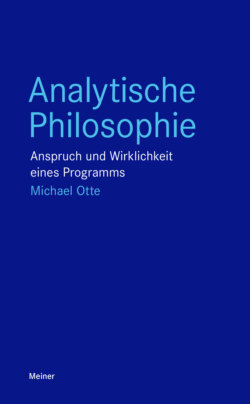Читать книгу Analytische Philosophie - Michael Otte - Страница 19
На сайте Литреса книга снята с продажи.
II.Analytische Philosophie zwischen Sprache, Logik und Mathematik
ОглавлениеIn einem Korb liegen 2 Eier. Die Mutter tut 2 weitere Eier in den Korb und fragt das Kind: Wie viele Eier befinden sich nun im Korb? Antwort: 4!
Mutter: Aber waren nicht die ersten Eier weiß und die zweiten braun gewesen!?
Kind: Es sind doch alles Eier!
Noch ein Problem: In einem Käfig befindet sich ein Tier. Der Vater sperrt ein weiteres Tier in den Käfig. Wie viele Tiere befinden sich nun im Käfig?
Kind: Das weiß ich nicht!
Vater: Was heißt das, weiß ich nicht. Kannst du denn nicht bis 2 zählen?
Kind: Es kommt doch darauf an, um welche Tiere es sich hier handelt!
»The subject matter of logic is intensions (concepts); that of mathematics is extensions (sets)« (Gödel, in: H. Wang, A Logical Journey, The MIT Press Cambridge/ USA 1996, p. 247)
»The difference between the logic of philosophy and mathematics is […] that in mathematics the reasoning is frightfully intricate, while the elementary conceptions are of the last degree of familiarity, in contrast in philosophy, where the reasonings are as simple as can be, while the elementary conceptions are abstruse and hard to get clearly apprehended« (Peirce, Collected Papers 3.560).
»There are two modes of cognitive functioning, two modes of thought, each providing distinctive ways of ordering experience, of constructing reality. The two (though complementary) are irreducible to one another. Efforts to reduce one mode to the other or to ignore one at the expense of the other inevitably fail to capture the rich diversity of thought. Each of the ways of knowing, moreover, has operating principles of its own and its own criteria of well-formedness« (J. Bruner, Actual Minds, Possible Worlds, Boston 1986, p. 11).
